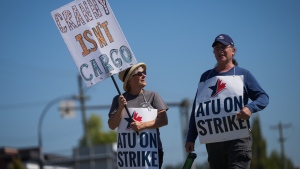Metro Vancouver’s HandyDART Strike Continues as Talks Break with No Deal
The HandyDART strike in Metro Vancouver shows no signs of ending as talks between the union and employer have broken down with no agreement reached.
The strike, which began on November 1, has left many vulnerable residents without access to essential transportation services. HandyDART is a door-to-door transit service for people with disabilities and seniors who are unable to use public transit.
Negotiations between the union, Unifor Local 111, and the employer, First Transit, have been ongoing for several weeks. However, talks broke down on Monday after the two sides were unable to come to an agreement on key issues.
According to Unifor, the main sticking points in the negotiations are wages, benefits, and working conditions. The union is seeking a wage increase of 3.5% per year for the next three years, as well as improved benefits and working conditions for its members.
First Transit, on the other hand, has stated that it is unable to meet the union’s demands due to financial constraints. The company has offered a wage increase of 2% per year for the next three years, which the union has rejected.
As a result of the breakdown in talks, the strike will continue indefinitely, leaving many HandyDART users stranded and unable to access essential services such as medical appointments and grocery shopping.
In a statement, Unifor Local 111 President Balbir Mann expressed disappointment in the lack of progress in negotiations and urged the employer to return to the bargaining table to reach a fair deal for its members.
Meanwhile, First Transit has stated that it is committed to finding a resolution to the strike and is open to further negotiations.
The HandyDART strike has also received attention from local politicians, with Vancouver Mayor Kennedy Stewart calling for both sides to return to the bargaining table and find a solution that will end the strike.
In the meantime, HandyDART users are left to find alternative means of transportation, with some relying on family and friends or paying for expensive taxi services.
The strike has also caused disruptions to other transit services, with some bus routes being cancelled or delayed due to a shortage of drivers.
As the strike continues, it is clear that both sides must come to a resolution in order to provide essential transportation services to those who rely on HandyDART. Until then, the strike will continue to have a significant impact on the lives of many vulnerable residents in Metro Vancouver.



